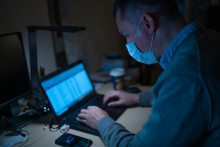Under normal circumstances, UT researchers Beekman (Applied Microfluidics for BioEngineering Research) and Mathew (NanoElectronics Group) would be using their patented nanosensor for detection of cancer biomarkers. Instead, they will now dedicate their technology and start-up ECsens to coronavirus research.
Same concept, different target
‘We can apply our existing technology,’ explains Mathew. ‘The concept and the device will remain the same. Our sensor is very versatile, and so we can simply change the target: from cancer to COVID-19. We believe we can create a device that detects the virus at a very early stage. And within minutes.’
The idea of detecting bacteria and viruses was already in the scientists’ minds, explains Beekman. ‘We were already running a project with MST’s pulmonology department. Once corona happened and we were stuck at home, not allowed in the lab, we quickly decided to focus on COVID-19 and immediately started looking for funding.’ Within a few weeks, their project got a grant from Health Holland and it can now officially kick-off in collaboration with UT professor Séverine Le Gac.
Available in one year
Not only did the project start fast, the scientists expect the final result to be available rather quickly as well. ‘There is a proof-of-concept, we just need to prove it works with viruses and validate it for COVID-19,’ says Mathew. ‘We plan to have the device on the market in one year from now, so that people can truly benefit from it. Our goal is to have a small machine that can be used anywhere – hospitals, airports and other places where people gather, such as festivals.’
'Our goal is to have a small machine that can be used anywhere'
False negatives
The QoroNano system, as it’s called, should be able to detect coronavirus from a throat or nasal swab. Moreover, the method could be sensitive enough to detect viruses in patients in their incubation period. ‘That is very important, because right now labs get a lot of “false negatives”,’ says Beekman. ‘Existing tests only detect coronavirus after seven to ten days of incubation period, so often the patient is declared healthy. I don’t think there is a single reliable serological test out there right now.’
Working on their ‘fast and ultrasensitive’ virus detection system, the researchers were among a selected group of people allowed in labs on the UT campus. ‘In the first stage we can use labs at the UT, because we will be using safe virus models,’ explains Beekman. ‘However, once we are ready for the second stage, we need to use the very secure microbiology lab LabMicTA in Hengelo. I’m very excited about that. I look forward to putting on the space suit and get to work. Sitting at home makes you feel useless. I’m glad we can get out and contribute.’









